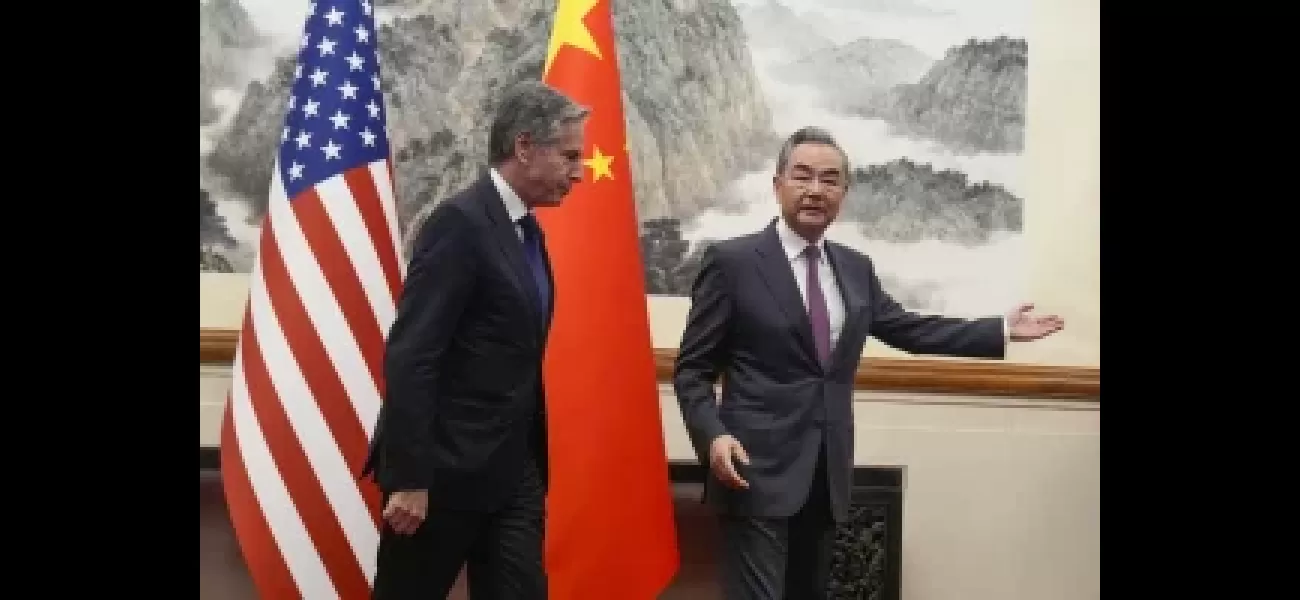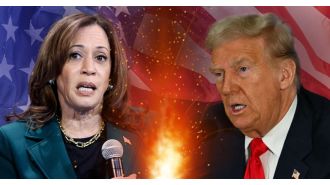US and China exchange cautionary statements regarding potential misunderstandings and mistakes.
US and China clashed over various issues during a meeting between Secretary of State Blinken and Chinese officials, highlighting the risks of misunderstandings.
April 26th 2024.

Beijing was the site of a tense meeting between the United States and China as Secretary of State Antony Blinken sat down with senior Chinese officials on Friday. The discussions covered a range of controversial issues, both on a bilateral and global scale. Blinken expressed concern over the potential for misunderstandings and miscalculations between the two countries.
The talks began with Chinese Foreign Minister Wang Yi and then Public Security Minister Wang Xiaohong, who also mentioned that Blinken would have a meeting with President Xi Jinping. This meeting had been anticipated but had not been officially announced by either side. A State Department official later confirmed that the meeting with President Xi would indeed take place before Blinken's departure on Friday.
Despite growing differences between the two nations, talks between them have been increasing in recent months. Both Blinken and Wang emphasized the importance of keeping communication lines open, but also acknowledged that the divisions between them were becoming more serious in nature.
The issues to be discussed were numerous, including Taiwan and the South China Sea, as well as trade and human rights. Tensions were further heightened earlier in the week when U.S. President Joe Biden signed a foreign aid bill that contained elements that China found problematic.
During their discussions, Wang alluded to a long list of concerns, including China's support for Russia, the production and export of synthetic opioids, and U.S. policies on the South China Sea, Taiwan, and human rights. He emphasized the need for mutual respect of each other's core interests and urged the U.S. not to interfere in China's internal affairs or hinder its development.
In response, Blinken reaffirmed the Biden administration's commitment to dialogue with China, even on contentious issues. He acknowledged that some progress had been made in the past year but also acknowledged that these conversations would continue to be challenging.
The Secretary of State arrived in China on Wednesday, just before President Biden signed a $95 billion foreign aid package that included provisions that would likely upset China. This includes $8 billion to counter China's aggressive actions towards Taiwan and in the South China Sea, as well as efforts to force the sale of Chinese-owned social media platform TikTok.
Both China and the U.S. play significant roles in the Indo-Pacific region. The U.S. has become increasingly concerned about China's growing assertiveness towards Taiwan and neighboring Southeast Asian countries, with whom China has ongoing territorial and maritime disputes in the South China Sea.
China has strongly opposed U.S. aid to Taiwan and has condemned the foreign aid package as a dangerous provocation. They have also spoken out against attempts to force the sale of TikTok. Additionally, the bill includes $61 billion in aid to Ukraine to defend itself against Russian aggression. The Biden administration has criticized China for its support of Russia's military sector, which has allowed Moscow to evade western sanctions and escalate attacks on Ukraine.
The U.S. has made it clear that China's relationship with Russia will be a major topic of discussion during Blinken's visit. Shortly before Friday's meetings, Russian President Vladimir Putin announced that he would be visiting China in May, further highlighting the complex dynamics at play between these world powers.
The talks began with Chinese Foreign Minister Wang Yi and then Public Security Minister Wang Xiaohong, who also mentioned that Blinken would have a meeting with President Xi Jinping. This meeting had been anticipated but had not been officially announced by either side. A State Department official later confirmed that the meeting with President Xi would indeed take place before Blinken's departure on Friday.
Despite growing differences between the two nations, talks between them have been increasing in recent months. Both Blinken and Wang emphasized the importance of keeping communication lines open, but also acknowledged that the divisions between them were becoming more serious in nature.
The issues to be discussed were numerous, including Taiwan and the South China Sea, as well as trade and human rights. Tensions were further heightened earlier in the week when U.S. President Joe Biden signed a foreign aid bill that contained elements that China found problematic.
During their discussions, Wang alluded to a long list of concerns, including China's support for Russia, the production and export of synthetic opioids, and U.S. policies on the South China Sea, Taiwan, and human rights. He emphasized the need for mutual respect of each other's core interests and urged the U.S. not to interfere in China's internal affairs or hinder its development.
In response, Blinken reaffirmed the Biden administration's commitment to dialogue with China, even on contentious issues. He acknowledged that some progress had been made in the past year but also acknowledged that these conversations would continue to be challenging.
The Secretary of State arrived in China on Wednesday, just before President Biden signed a $95 billion foreign aid package that included provisions that would likely upset China. This includes $8 billion to counter China's aggressive actions towards Taiwan and in the South China Sea, as well as efforts to force the sale of Chinese-owned social media platform TikTok.
Both China and the U.S. play significant roles in the Indo-Pacific region. The U.S. has become increasingly concerned about China's growing assertiveness towards Taiwan and neighboring Southeast Asian countries, with whom China has ongoing territorial and maritime disputes in the South China Sea.
China has strongly opposed U.S. aid to Taiwan and has condemned the foreign aid package as a dangerous provocation. They have also spoken out against attempts to force the sale of TikTok. Additionally, the bill includes $61 billion in aid to Ukraine to defend itself against Russian aggression. The Biden administration has criticized China for its support of Russia's military sector, which has allowed Moscow to evade western sanctions and escalate attacks on Ukraine.
The U.S. has made it clear that China's relationship with Russia will be a major topic of discussion during Blinken's visit. Shortly before Friday's meetings, Russian President Vladimir Putin announced that he would be visiting China in May, further highlighting the complex dynamics at play between these world powers.
[This article has been trending online recently and has been generated with AI. Your feed is customized.]
[Generative AI is experimental.]
0
0
Submit Comment





